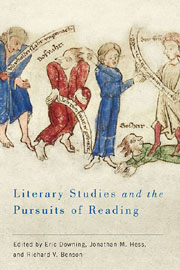Book contents
- Frontmatter
- Contents
- List of Illustrations
- Introduction
- Part I Medieval and Early Modern Practices of Reading
- Part II Reading, Secularization, and Transcendence in the Long Nineteenth Century
- Part III Theories and Practices of Reading in the Twentieth Century and Beyond
- 9 Magic Reading
- 10 “Anything One Wants”: Kafka and Women, Again
- 11 Reading on the Edge of Oblivion: Virgil and Virgule in Coetzee's Age of Iron
- Part IV Postscript: The Ends of Reading
- Works Cited
- Notes on the Contributors
- Index
10 - “Anything One Wants”: Kafka and Women, Again
from Part III - Theories and Practices of Reading in the Twentieth Century and Beyond
Published online by Cambridge University Press: 05 February 2013
- Frontmatter
- Contents
- List of Illustrations
- Introduction
- Part I Medieval and Early Modern Practices of Reading
- Part II Reading, Secularization, and Transcendence in the Long Nineteenth Century
- Part III Theories and Practices of Reading in the Twentieth Century and Beyond
- 9 Magic Reading
- 10 “Anything One Wants”: Kafka and Women, Again
- 11 Reading on the Edge of Oblivion: Virgil and Virgule in Coetzee's Age of Iron
- Part IV Postscript: The Ends of Reading
- Works Cited
- Notes on the Contributors
- Index
Summary
From the beginning, rhetoric has focused on the speech act as communication. At the very least, two parties were involved, speaker and listener. The immediate and complex relationship of face-to-face communication became the model for discussing the very different situation of the writer and the reader with the introduction of a text into the situation. Reading replaces listening; but while one cannot ever re-listen (a recording is hardly the authentic performance), one can re-read a text. All of this has been obvious since Plato. The multiplicity of reading derives from, as Plato noted, the absence of the speaker, and consequently the absence of the authority that might enforce a certain understanding. Franz Kafka, we recall, seemed to see the universe from this perspective—the speaker is always absent, and, with him, any certain understanding.
The “certain understanding” that has vanished with the speaker places all the burden of meaning on the reader. Hermeneutics, and therefore criticism, was born with literacy. With an absent authority, an absent speaker, an absent father, an absent God, reading is a struggle of power, anarchic and given over to the flux of history. What seems to be the center of discussion at a given moment, the place where most of the disputants engage in their disputes, becomes a regional locality when an outside group redirects the discussion to its own area, now the new center. And so it has been throughout twentieth-century and now twenty-first-century Kafka criticism.
- Type
- Chapter
- Information
- Literary Studies and the Pursuits of Reading , pp. 216 - 232Publisher: Boydell & BrewerPrint publication year: 2012

